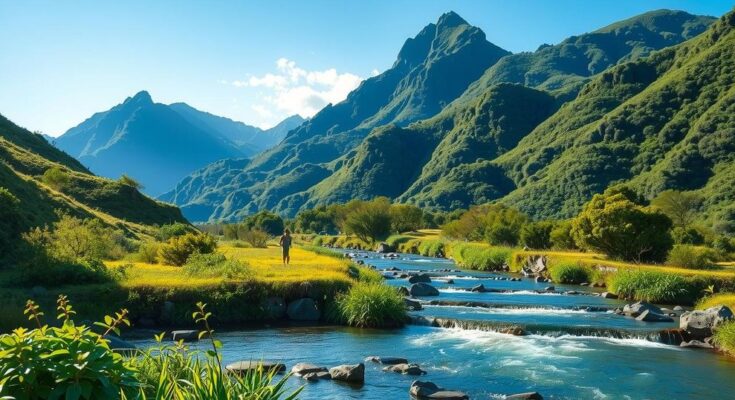Ecuador’s presidential elections on February 9 feature candidates Daniel Noboa and Luisa González, focusing primarily on economic and security concerns over environmental issues. Noboa plans major investments in oil and gas, while González advocates for clean energy and Indigenous rights. The election results will determine the future direction of environmental policy in the country.
On February 9, Ecuador is set to hold its presidential elections featuring incumbent Daniel Noboa and challenger Luisa González. Both candidates prioritize security and economic stability over environmental concerns such as climate change, deforestation, and water scarcity, although they propose increased protections for forests and Indigenous communities. Furthermore, they plan to attract foreign investment in the mining, oil, and gas sectors, potentially jeopardizing the country’s fragile ecosystems.
Daniel Noboa assumed the presidency amidst a national crisis following the impeachment of Guillermo Lasso for corruption. Noboa, having limited political experience, faces criticism regarding his handling of security and energy issues. His plans include significant investments in the oil and gas sector, prioritizing economic growth despite potential climate implications. In contrast, Luisa González seeks to bolster environmental protections and transition to clean energy, although specifics of her proposals remain vague.
Noboa acknowledges climate change and emphasizes sustainable development, reducing greenhouse gas emissions, and enhancing community resilience to climate impacts. However, his administration’s decisions, particularly regarding oil drilling, have raised concerns among Indigenous communities and environmental activists about the prioritization of economic interests over environmental sustainability. Critics argue that Noboa’s approach reflects a troubling trend of undermining human rights and environmental protections.
González, representing the left-wing Citizen Revolution Movement, seeks to prioritize climate issues, supported a transition to clean energy, and called for the protection of Indigenous rights. Nevertheless, she acknowledges the necessity of responsible exploitation of natural resources. Her campaign promises include enhancing Ecuador’s existing climate change adaptation plan and reversing previous government layoffs in conservation sectors.
To secure the presidency, González must either achieve an absolute majority or exceed 40% of the vote with a margin of 10% over Noboa. Should neither candidate meet these requirements, a runoff election will be held in April, similar to the previous year’s elections. With the environmental stakes high, the outcome will significantly influence Ecuador’s ecological future in the upcoming term.
Ecuador is preparing for presidential elections with a focus on security and economic issues, overshadowing critical environmental concerns. Historical context includes President Guillermo Lasso’s impeachment and the subsequent rise of Noboa during a political crisis. The candidates’ differing approaches to the environment will play a crucial role in shaping Ecuador’s ecological landscape amid ongoing challenges related to climate change, deforestation, and Indigenous rights. In recent years, Ecuador has faced significant challenges including rising gang violence, energy shortages, and intensified debates over its reliance on oil and gas. Noboa’s past policies have drawn scrutiny for their impacts on environmental and human rights, while González seeks to implement more robust environmental protections amid calls for responsible resource management. The election results will be pivotal in determining future policies impacting Ecuador’s natural resources and communities.
The upcoming elections in Ecuador represent a critical juncture for environmental policy as candidates Daniel Noboa and Luisa González vie for the presidency. While both focus on security and economic development, their environmental proposals reveal contrasting priorities. Noboa’s plans risk exacerbating climate issues, while González aims to advance clean energy initiatives and protect Indigenous rights. The election outcome will significantly influence the future of Ecuador’s ecosystems and sustainability efforts.
Original Source: news.mongabay.com




